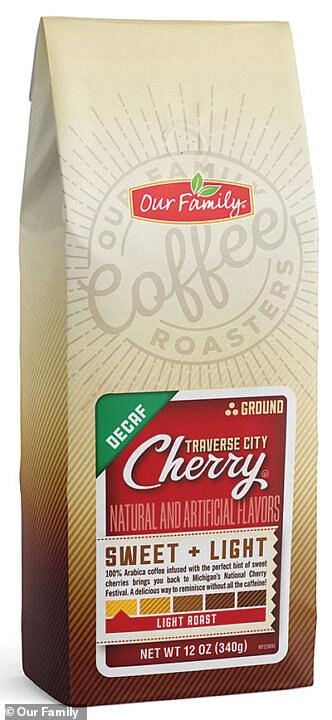Hundreds of coffee products popular across the Midwestern and Great Lakes are being recalled because of a labeling error.
A total of 692 cases of decaffeinated are being pulled from shelves after testing revealed several were full-strength coffee and had been mislabeled.
This could pose a health risk, as people who have a heart condition, high blood pressure or are pregnant are advised to avoid caffeine because of potential harmful side effects.
Consuming a full-strength coffee may cause these people to suffer from a heart flutter, surging blood pressure or other issues.
The recall was initiated by Massimo Zanetti Beverage USA, and involves 12-ounce bags of their Cherry-flavored Our Family ground ‘decaf’ coffee.
It was issued in 15 states, including Illinois, Michigan, Ohio and Wisconsin, and affects the artificially flavored light roast version.
Consumers have not been advised on what to do if they have a recalled product, but advice typically includes throwing it out or returning it to stores for a refund.

The recall affects Massimo Zanetti Beverage USA’s own-band Our Family Traverse City Cherry decaf coffee. It is sold in 12-ounce bags and is lightly roasted
The FDA first revealed the recall on March 12, but its risk level has now also been classified.
It has been classified as a Level II recall, which means the products pose a risk for certain people but are not likely to cause a serious health risk.
Customers are being urged to check the back of their Massimo Zanetti Beverage ‘decaf’ coffee to check whether it is part of the recall.
Recalled products bear the code UPC 0 70253 11080 1 and are marked with BEST BEFORE 080325 V 15:37 C’.
The states where the products were sold are: Colorado, Iowa, Illinois, Indiana, Kansas, Kentucky, Michigan, Minnesota, North Carolina, North Dakota, Nebraska, Ohio, South Dakota, Wisconsin and Wyoming.
They were distributed by Michigan-based SpartanNash company and are sold under the Our Family label, which is common in the Midwest and Great Lakes regions.
The FDA warns online: ‘Decaffeinated coffees and teas have less caffeine than their regular counterparts, but still contain some caffeine.
‘For example, decaf coffee typically has two to 15 milligrams in an 8 fluid-ounce cup.
‘If you react strongly to caffeine in a negative way, you may want to avoid these beverages altogether.’
An average cup of coffee contains around 95mg of caffeine.
All coffee starts out as caffeinated, with the decaf process involving soaking coffee beans in water or a solvent to extract the caffeine.
It is possible that this process was unsuccessful at extracting caffeine at the factory, or that the coffee beans did not go through this, and were just mislabeled.
Symptoms from consuming too much coffee include an increased heart rate, heart palpitations, insomnia, anxiety, jitters, upset stomach or nausea.
About 66 percent of Americans, or two-thirds, drink at least one cup of coffee every day.
And of these about 10 percent, or 26million people, are estimated to drink decaffeinated coffee daily.
This has recently become more popular amid the rising longevity movement, which urges people to consume less coffee to prioritize their sleep, but others also consume decaffeinated coffee for health reasons.
This article was originally published by a www.dailymail.co.uk . Read the Original article here. .


